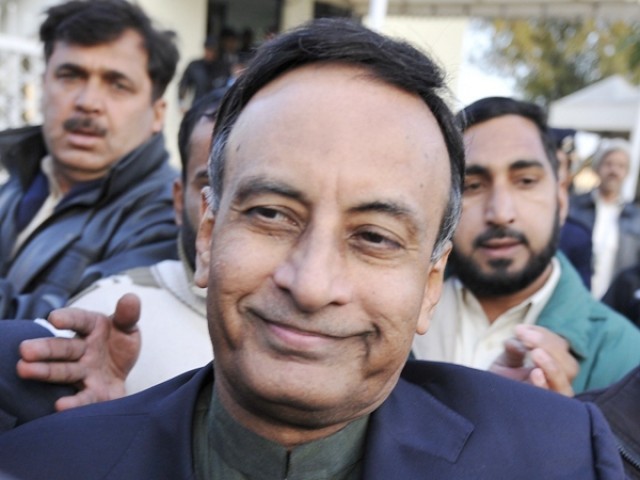Why would several prominent liberal, progressive and nationalist intellectuals, human rights and social media activists and public figures from Pakistan have to gather in London for a conference to chart out Pakistan’s future, rather than in Islamabad, Karachi or Lahore? Because in Pakistan, the future of free speech is looking bleaker than ever. Last weekend, former Pakistani ambassador to Washington, Husain Haqqani, and US-based columnist and doctor, Mohammad Taqi, gathered a large group of free thinkers in London for a conference titled ‘Pakistan: The Way Forward.’ 
[Video grab: YouTube]

Like last year, the gathering had to be arranged away from Pakistan because of the threats at home to the security of those who espouse alternative views or question the policies of the all-powerful military or state. No doubt, in Pakistan, the widening circle of repression of critical, dissenting voices to the state’s narrative have led to a shrinking space for liberal, secular, progressive ideas and pluralism. There are constant threats to democracy and to nationalists in Balochistan, Sindh and Khyber Pakhtunkhwa. Non-government organisations, human rights defenders and individuals are being victimised. Major political parties are demonstrating an inability to prioritise the protection of human rights and social justice. Let’s be clear: there is no doubt that Ambassador Haqqani is a divisive figure. Even as Pakistan’s ambassador to the United States, he was one of the most eloquent critics of Pakistan’s military, the nuclear-armed country’s most powerful institution. The joke at home was that he was Washington’s ambassador to Pakistan rather than the other way around. And when Haqqani resigned as ambassador in November 2011 and left Pakistan for exile, it was due to his alleged involvement in a scandal surrounding a secret memo that accused the army of plotting a coup and sought help from the United States to rein in the military. 
[Husain Haqqani exits the Supreme Court after meeting his lawyer Asma Jehangir, in Haqqani’s defence in the secret memo scandal case, in Islamabad on December 22, 2011. PHOTO: AFP/FILE] But the issue is not whether or not you like Ambassador Haqqani or his views. The issue is that Pakistan has a free speech problem and it’s not going away. The issue is that Pakistan has some real, existential problems that the powerful military and the governmnet don’t want you to talk about. Pakistan ranks among the bottom 10 countries for supporting free speech, according to data compiled by Pew Research Centre after conducting a survey of 37 states. Hundreds of people are in jail in Pakistan for alleged blasphemy and there have been at least 67 murders over unproven allegations since 1990. In January, several bloggers and activists alleged to have anti-military views disappeared, and although they were returned, the state now seems to have launched an all-out assault, including online, against those it perceives as opposing its views.

It is no wonder then that many people invited to the London conference didn’t show up, and those who did, left with a sense of unease at possible harassment by authorities back home. But if you take a look at what the group discussed, there are few of us who would honestly disagree with the issues that were raised:
- That Pakistan faces the risk of global isolation because of continuing proxy wars in its neighbourhood.
- That the Pakistani state continues to engage with religious extremists and terrorists, and even wants to mainstream extremist and terrorist organisations while remaining hostile to liberal, progressive and nationalist groupings within Pakistan.
- That political parties representing the ethnic Baloch, Mohajir, Sindhi and Pashtun segments of Pakistan’s population have been targeted by both state repression and hostile propaganda aimed at delegitimising them even when they have won clear electoral mandates from the people.
- That the state pursues repressive policies towards the population-wise smaller provinces and nationalities and their elected representatives.
Honestly, are these really completely crazy ideas that a bunch of Pakistanis had to go to London to be able to openly discuss? Isn’t there enough evidence to support that all this is actually happening? How many of you out there disagree that these are real issues? How many don’t think it’s time for Pakistan’s rich and powerful ruling elite to own up and take responsibility for the failed policies of the past instead of promoting conspiracy theories through manipulation of the mainstream mass media and increasing repression of the social media? Who among us doesn’t want a pluralist and tolerant, liberal, secular and progressive Pakistan that abides by internationally recognized human rights, allows full and free debate, treats all its people and nationalities fairly and is no longer seen around the world as an incubator for terrorism? Who doesn’t want a Pakistan at peace with itself and its neighbours and which is fully respectful of human rights of all, including religious minorities? So ask yourself this: is it not time for Pakistan’s rich and powerful ruling elite to own up and take responsibility for the failed policies of the past instead of promoting conspiracy theories through manipulation of the mainstream mass media and increasing repression of the social media? Who among you doesn’t want a pluralist and tolerant, liberal, secular and progressive Pakistan that abides by internationally recognized human rights, allows full and free debate, treats all its people and nationalities fairly and is no longer seen around the world as an incubator for terrorism? Who doesn’t want a Pakistan at peace with itself and its neighbours and which is fully respectful of human rights of all, including religious minorities?

Questioning state policies is a legitimate right of all Pakistanis. We must all stand together to oppose the tendency to label dissident voices as traitors or ‘kafirs’ (non-believers) in an effort to shut down debate and discussion of alternative policies. Don’t let anyone tell you that dissent is not patriotic. And Ambassador Haqqani and Dr Taqi, let’s hope you can take your conference to Pakistan next year.
